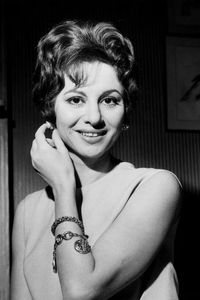Faten Hamama, a celebrated and illustrious Egyptian actress and producer, made her grand entrance into the world on May 27, 1931, in the charming city of El Mansoura, Egypt. Renowned for her captivating on-screen presence and impressive repertoire, she earned the esteemed moniker "The Lady of the Arabic Screen".
Faten, a precocious young individual, was utterly enthralled by the on-screen performance, to the extent that she felt as though the entire audience was rising to their feet in applause, bestowing upon her the accolades typically reserved for the leading lady of the production. This chance encounter had a profound impact on Faten's life, as her father, driven by a vivid vision of his daughter's future success in the cinematic world, enveloped her in a warm and loving embrace.
As a direct result of this serendipitous meeting, Faten's father took the initiative to dispatch her photograph to the esteemed director Muhammad Karim, a trailblazer in the realm of Egyptian cinema, who was actively seeking a talented young child to star in his latest film production in collaboration with the renowned Egyptian musician Mohamed Abdel Wahab.
Faten's talent and charisma on screen were first showcased in the 1940 film "A Happy Day", where she not only secured a role but also left a lasting impression on the filmmakers, prompting them to rewrite the script to provide her with more lines and scenes than initially planned. This impressive debut performance caught the attention of Karim, who subsequently placed her under contract, recognizing her potential for stardom.
Four years later, Karim once again entrusted Faten with a significant role in the 1944 film "A Bullet in the Heart", this time partnering her with the renowned Abdel Wahab. The collaboration proved to be a fruitful one, further solidifying Faten's position as a rising star in the Egyptian film industry.
Her third cinematic outing with Karim, "Dunia" in 1946, served as a testament to her remarkable acting abilities and versatility, showcasing her readiness to take on more substantial and complex roles.
Faten's father, along with her entire family, made the significant decision to relocate to Cairo, a pivotal move that would ultimately enable her to pursue her dream career in the world of entertainment. This monumental shift in their lives took place in the year 1946, a momentous occasion that marked the beginning of her formal training in the art of acting.
Faten's professional trajectory was significantly impacted by the exertion of political influence, prompting her to temporarily relocate from Egypt to Lebanon and subsequently London, England, between 1966 and 1971.
During this period, Egyptian President Gamal Abdel Nasser made concerted efforts to persuade Faten to reestablish her presence in Egypt, yet she steadfastly resisted these pressures.
Ultimately, Faten relented and returned to Egypt in 1971.
The remarkable return of this esteemed individual to the Egyptian cinematic scene had a profound impact, injecting a fresh dose of vitality into the industry and cementing her reputation as a visionary filmmaker. Her subsequent body of work continued to garner widespread critical acclaim, with a keen focus on exploring the intricacies of family dynamics and societal values through her films.
Her initial foray back into filmmaking was the short film "Witch", a collaborative effort with the esteemed actor Salah Zulfikar. This was swiftly followed by the highly successful "Empire M" (1972),a poignant drama that showcased her remarkable talent as a performer. In this film, she brought to life the complex and compelling character of a widow, struggling to raise a large family of six children in the face of adversity.
Faten's outstanding performance in the cinematic masterpiece "Empire M" garnered her a prestigious accolade from a prominent organization within the Soviet Union, as she took center stage at the renowned Moscow International Film Festival. This remarkable achievement served as a precursor to her subsequent film, "I Need a Solution", which premiered in 1975 and went on to achieve unprecedented success, ultimately contributing to significant reforms in Egyptian marriage and divorce laws.
Faten Hamama, a luminary in the realm of Egyptian cinema, has left an indelible mark on the industry, her legacy cemented as the fourth Pyramid in Egyptian cinema, a radiant gem that continues to radiate brilliance on the silver screen, its luminosity unwavering despite the passage of time, a testament to her enduring appeal and the timeless quality of her performances.



















